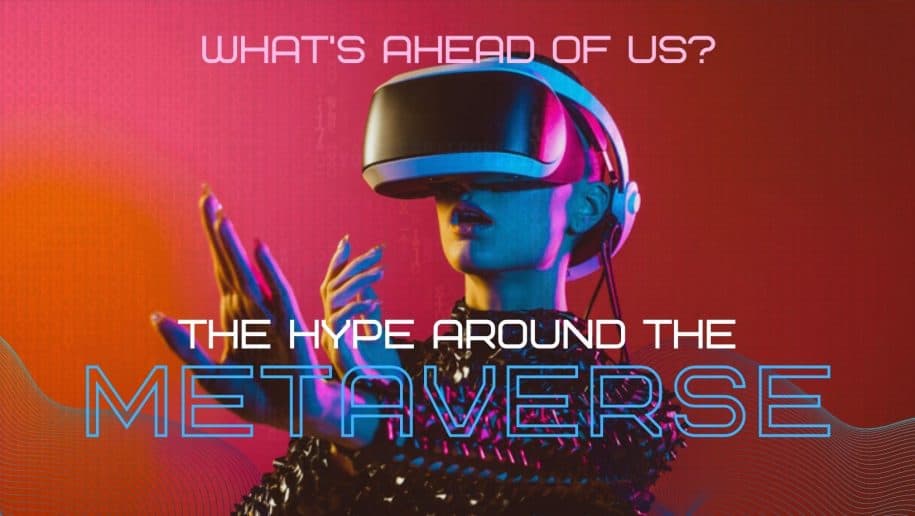Why has the Metaverse all of a sudden become the main discussion topic in the high tech industry and in the field of immersive technologies?
The main reason is the strong interest of some Tech Giants like Facebook, Amazon and Microsoft that have been heavily investing in this field in the last few years.
Facebook in particular, since the acquisition of Oculus, has been moving along a clear path, with the intent to create an ecosystem of hardware and software that will provide an immersive environment that mixes and integrates in one place tools that are already separately available, i.e. social networks, private messaging, 3D avatars and remote meetings.
The recent Facebook announcement about the company changing its name to Meta, provides further evidence of how much Mark Zuckerberg is interested in investing in this new paradigm.
What is the Metaverse?
The term Metaverse was coined in 1992 by the author Neal Stephenson in his Sci-Fi novel Snow Crash. In this book the Metaverse is described as some sort of virtual reality on the internet where individuals could interact using their respective avatars. This novel is a dystopia and therefore, besides the origin of the term, there are not many similarities with the idea of Metaverse that is discussed today.
The first experiments open to any user that come to our minds are represented by several projects that came to life starting from the 2000s onward and that include video games and simulators like The Sims, Second Life, IMVU and a few others.
So the Metaverse is a concept that has been around for quite some time and that has evolved alongside the evolution of contiguous technologies like the internet, 3D, hardware processing power and wearable devices.
“There’s a whole other definition, which is the really broad one, which is the Metaverse is just the future internet”

Not just Avatars and Holograms
When the pandemic outbreak began, one of the biggest needs that immediately emerged was to find appropriate alternatives to physical meetings, including school lessons. This need pushed companies in the video conferencing sector to further improve their products by releasing new features.
One of the most discussed experimental features is the introduction of 3D avatars in video conferencing tools in order to provide a more immersive meeting experience, closer to a physical one.
Avatars are a virtual representation of an individual and can have different shapes and characteristics, they can be bidimensional or tridimensional, cartoonish or photorealistic, and in any case their purpose is to represent the user’s presence within a certain environment, virtual, real or mixed.
This is exactly what happened with Second Life first and with Facebook VR, Roblox, Fortnite and many more later. We are destined to have an Avatar alter ego in the Metaverse in order to explore this world and to interact with other people. One day they’ll further evolve into holograms, almost indistinguishable from real people, but it still takes some time to get there.
Of course the idea of a Metaverse should not be restricted to Avatars and Holograms interacting with other avatars or real people. This is just an aspect of an extended concept of collaboration that the Metaverse would be capable of realizing. Other aspects would be important, if not to say more relevant, as well.

The Metaverse belongs to everyone, not to a single company
What may not be actually clear to everybody is that the Metaverse is not a brand or a product owned and controlled by one or more companies, but it is rather a virtual environment open to everybody and open to host information and content from the entire internet community.
Big Tech companies surely have the financial resources it takes to shape the Metaverse according to their vision and this may raise concerns regarding how open this space would be and how much power would users have to contribute to it in an active way.
Even if large IT companies will offer their services using proprietary technologies, we strongly support the idea that the Metaverse will be a viable concept, as long as it will guarantee open interoperability standards to successfully integrate everyone’s content, just like the internet has done up to now.
The Metaverse: from a questionable idea to an actionable concept
According to a narrow but radical standpoint, the Metaverse would ideally be a parallel digital replica of the real world where people, thanks to Technology, will spend most of their lives while buying, consuming, playing, interacting with others for both entertainment and business purposes.
Much emphasis is placed on the power of virtual and augmented reality to realize such a potential. On the other hand, this concept of a Metaverse is quite reductive as it does not take into account the complexity and richness of human interactions and experience, even when it comes to the simplest forms of social interactions and for most of our real life purposes.
According to such a narrow meaning, the Metaverse would end up in a surrogate of the real world that, if not properly treated, would limit human potential rather than fully realizing it.
In other words, the idea that everything we do in our real lives would have a correspondent in the Metaverse is questionable, as the consequences of squeezing our real world human experience into a digital format might end up in a form of extremely simplified experience and a socially distorted human interaction. This would entail consequences that would be better to explore right at the beginning with an appropriate ethical framework.
Luckily enough, the Metaverse in a wider meaning is nothing like that. As long as it will help people realize their potential while helping them solve problems in their real lives, the concept of a Metaverse will be viable and rich with positive consequences. On the other hand, emerging technologies like AI, Robotics and Mixed Reality have a huge impact on our lives and must be considered as forces that will profoundly transform our society on a global scale.
The pervasiveness and ubiquity of technology in our lives is blurring the distinction between real and virtual as well as the distinctions between human, machine and nature. Understanding and governing such an epochal transformation requires new concepts that cannot be borrowed from the past. And it is here that categories such as those introduced by the “Onlife Manifesto” by Luciano Floridi and others come into play.

The Metaverse we would like to live in
If what we have said above is true, the concept of a Metaverse does not add any new element to the transformative process our global society is undergoing. Besides the marketing hype, we really see the Metaverse as the natural evolution of the internet, with a high amount of user-generated content and open protocols, with just a shift from 2D to 3D and improved interactions between real and digital. In the field of immersive technologies this kind of infrastructure has often been referred to as the AR Cloud. But that is just another way to name this transformation.
As the global tech ecosystem is growing full of companies that compete to win the race to the Metaverse, there will be many declinations of the Metaverse in real life. Some of the areas of application where we see more potential include the following:
- WORK & COLLABORATION
- Remote meetings and Collaboration tools will be developed further in the effort to make the interaction among the participants much more realistic and immersive compared to how they work today. In this transition 3D avatars will have a central role.
- PRIVATE LIFE & GAMING
- Private entertainment has changed a lot in the last decade, in particular because on-demand streaming content and gaming platforms have witnessed a massive adoption with a consequent shift of the places where entertainment is consumed, from physical places (e.g. cinemas) to private and virtual places.
- BUSINESS
- There are so many industries that can take advantage of the Metaverse, intended as an expanded ability to access contextual information related to products and services. Especially if the adoption of wearable devices will take off, we expect to see a change of paradigm in how retailers, museums, restaurants and many other businesses communicate with their potential customers.
Being Inglobe Technologies a developer of products that give users the ability to create and publish immersive content, we really look forward to enabling AR-media and HyperIndustry users to eventually share their projects within a larger network.
In conclusion, if the Metaverse will evolve in an open and participative direction, whoever in the community will be able to enrich this new world with her contributions.
The pace at which this change will happen is largely dependent on the adoption rate of immersive devices, in particular AR and VR headsets. Since some of the large IT companies promoting the Metaverse are also manufacturers of such devices, it is plausible to expect that they will work hard to promote the switch from smartphones to headsets, or at least to promote an integration between the two.
The transition from a 2D Internet to a 3D Internet has just begun and we are excited to be part of this transformation, looking to improve and expand what we already do everyday with over 50.000 creators around the world.

